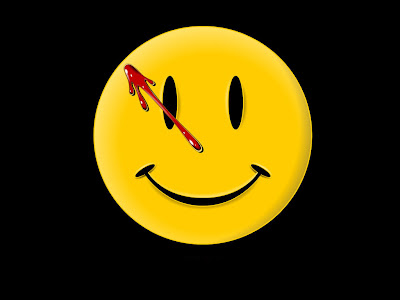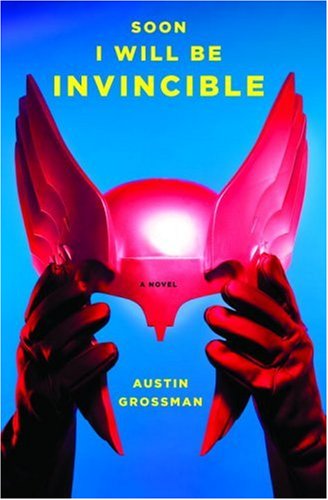The new Superhero era: The Sanctioned and Enforced Era
/
I saw Hancock in New York City over the weekend. For all the negative reviews out there, it was actually quite a fun film to watch, somewhere between a rated R-Comedy and a somewhat serious drama about a superhero. The film follows Hancock, a drunk, lazy and pissed off super being. Appropriately, the film opens with him passed out on a park bench. Then, bottle in hand, he takes down an SUV full of gun toting gangsters, leaving a trail of wreckage in his way. When he saves a publicist, they start to work on changing his image, first with him going to jail. First half done. There's a lot of laughs here, from Walter the Grey Whale to dropping a bully from a low orbit and catching him. The second half of the film is more drama-y, as we learn that Hancock doesn't know his past. Various revelations later, we find out his backstory, and he's a changed man. I think this makes the film a little off-balance, but overall, it works. It's enjoyable to watch, and it bring up some very interesting points when it comes to the entire Superhero genre. An additional point about the movie - Jason Bateman, whom I'm a huge fan of from Arrested Development, is a real shining star in this film - he's perfect for the role that he played here, and worked extremely well with the comedy/drama nature of this film.
The main thing that interested me here was how this film seems to represent the role in which comic book characters or superheroes now seem to play in society - this is something that I have noticed in a number of other genre sources, and it seems to be a very widespread change to the way in which superheroes are looked at - Superheroes being legitimized, generally through direct governmental intervention in said comic book universe.

The first time that I really noticed this was with the recent arc that Marvel released, entitled Civil War. This storyline, and numerous threads leading up to it, brought in the Superhuman Registration Act. This isn't necessarily a new concept in the Marvel Universe, or in comics in general. X-Men has dealt with the issue numerous times since the 1980s. What makes the Civil War arc special, at least from my point of view, is that it draws in the entire marvel community to some degree, opening up fault lines between characters. The act requires superhumans to register with the federal government, to put them under more direct control - this is sparked by a disaster when several superheroes fought several villains, killing hundreds of people in the sidelines, including children. This seems to really pull from the post 9-11 mentality of a tragedy and a huge response afterward.
This comes through in Hancock, somewhat. Hancock, a drunk and reckless superhero, seems to have caused multiple millions of dollars with his acts. In the opening scene, we see him destroy a park bench and storefront taking off, a highway directional sign, numerous police cars, a huge groove in the interstate deck, damage to several buildings before finally dropping a car on top of a building's spire. It's mentioned in in the film that this cost the city almost 9 million in damages. From there, Bateman's character convinces him to go to prison for his acts, in an attempt to appease the public, and to make them realize how much he is needed in LA. Furthermore, Bateman works with Hancock to try and get him to change how he approaches his rescues, his image in general, trying to fit more in with the public. Hancock isn't completely regulatory, but it does seem to impose some limits and realism to a traditional comic book role. It also outlines some of the basic problems with holding a superhero in prison - at one point, Hancock hops a fence to get a ball, but returns.

Two sources show worlds in which superheroes are banned by the government - The movie The Incredibles and the comic Watchmen. The Incredibles shows a sort of public outrage similar to what we see in Hancock - bystanders are injured and structures are damaged during rescues. As a result, the Superhero Relocation Program was set up, forcing superheroes to go undercover and to resume a normal life - something that most aren't really willing to do. The same thing happens in Watchmen - superheroes are likewise banned, this time via the Keene Act. Some of the costumed heroes, like Rorschach, have a difficult time returning to normal life, and continue to act in the interest of the public. There is much discussion of their return following the murder of one of their kind.

Finally, in the book Soon, I Will Be Invicible, by Austin Grossman, there is a very detailed back story to most of the heroes in the book, and a group called the Champions seems to have been a sanctioned governmental group to fight crime. The group that takes most of the action in the book, the New Champions, likewise seems to be at least tolerated, on the same level that the Avengers or the Justice League was tolerated.
Why are we seeing this switch in themes and styles since the 1980s? In part, it seems to be a material issue, especially with the Civil War arc, but overall, there seems to be far more realism pushed into comic books nowadays - and this is something that I've noticed across the board when it comes to the entertainment industry, and especially with films like Hancock and books like Soon, I Will Be Invincible, which almost blend seamlessly into 'our' world. Yet, there has always been a relative connection to the real world - World War II, Fascim, Communism, Vietnam, all events that share a connection to the real world.
Now, there's a push for oversight of the superheroes - it's almost an interesting parallel in an age of 'big government' and when the current governmental debt is $9,473,062,472,197.15. There's a lot of broad regulation in society nowadays, and logically, it makes sense that if there were costumed vigilantes, the government would work to try and legitimize them as well, in the interest of public safety. This is a pretty far cry from their origins, when heroes were largely left to their own devices, or harassed occasionally by police. (I'm speaking in broad terms here). In most cases, this government interference runs against what most superheroes stand for - some, such as Batman and Spiderman believe that the government really hasn't done their part to keep the streets clear of crime. Others seem to think that this sort of thing will hamper their efforts, and are essentially social outcasts anyway. One of the main issues in Civil War was that superheroes would have to publicly identify their alter-egos, in much the same way that judges and police officers are public figures, and face some of the same threats.

Some of this shift should probably also be credited towards how society seems to operate nowadays, turning this entire thing into a weird social commentary. The main theme with people seems to be to shift blame to someone else - "It's not my fault, it's ...." or "ADHD is responsible for my child's hyperactivity, not my poor parenting skills". Taking control of superheroes seems to be a way in which they can be used to either take the blame for when society goes wrong, where they are apparently not doing their job, much as can be argued for police and civil authorities, but also a way for governments to cover their collective butts when something, such as the Stamford, CT disaster (Civil War), the 1977 Riots in New York City (Watchmen) or the other various events. It seems that if the government tolerates the acts of costumed heroes, they themselves are responsible for their actions, sanctioned or not, and when major disasters happen, there is an attempt to rein them in somewhat. This is seen brilliantly in Soon I Will Be Invincible, where the main villian, Dr. Impossible, isn't so much evil, as he suffers from "Malign Hypercognition Disorder".
Is this sort of thing enough to consider the past couple of decades an era or sequence in and of itself, given the amount of detail and thematic distinction between this and other comic book eras?
